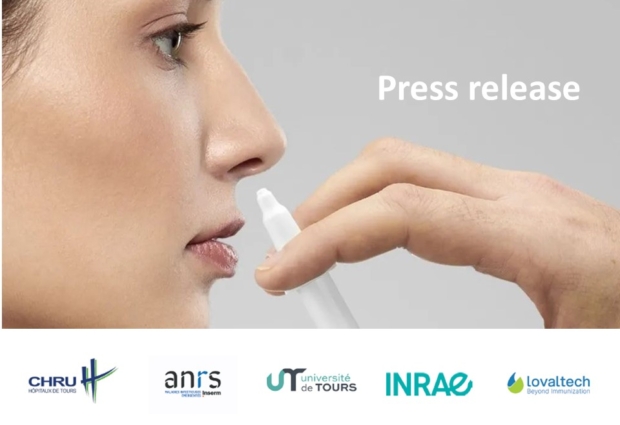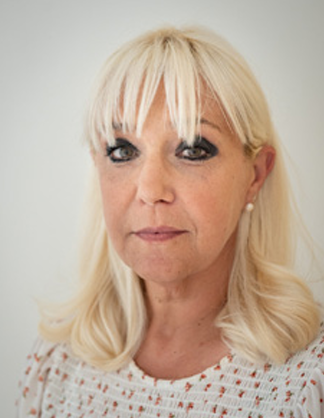“With MUCOBOOST, the Clinical Research and Innovation Department of Tours University Hospital and its Clinical Investigation Center demonstrate their maturity and the excellence of their expertise in promoting Phase 1 clinical trials. For the first time, Tours University Hospital is experimenting with the co-sponsor status alongside ANRS MIE, which is now allowed under European regulations. This decision highlights our commitment to developing collaborations and our openness on a national scale. This innovation – which we are proud to lead – follows in the footsteps of renowned virologists from Tours such as Philippe Maupas and Philippe Roingeard.”
Mathilde Sigaud-Fils, Director of Research and Innovation at Tours University Hospital.

First human administration of a nasal vaccine against COVID-19:Tours University Hospital launches the MUCOBOOST clinical trial
Last updated on 25 March 2025
The essentials
A major milestone in the development of a nasal vaccine against COVID-19 has just been reached: five years after the pandemic, the Tours University Hospital (TUH) and the ANRS Emerging infectious diseases (ANRS MIE), co-sponsors, have been authorised to begin the MUCOBOOST clinical trial. This candidate vaccine, based on an innovative technology, could revolutionise the prevention of respiratory infections. Developed by the biotechnology start-up Lovaltech, based in Tours, this innovation positions France as a pioneer in new-generation vaccination.
The vaccine, administered as a nasal spray, should provide total protection against COVID-19. It should provide effective protection against all variants of the virus and block its transmission, thereby reducing human-to-human contagiousness and virus circulation.
MUCOBOOST in a nutshell
MUCOBOOST is a randomised, controlled, multicentre phase I/II trial comparing the safety and immunogenicity of a booster dose of an intranasal COVID-19 vaccine expressing recombinant N/S SARS-CoV-2 proteins to a booster dose of an mRNA COVID-19 vaccine in healthy adult volunteers.
- Co-promoter: Tours University Hospital / ANRS MIE
- Scientific coordinator: Pr Isabelle DIMIER-POISSON, University of Tours
- Coordinating investigator: Dr Zoha MAAKAROUN-VERMESSE, Tours University Hospital
- Co-ordinating investigator: Pr Odile LAUNAY, CIC Cochin Pasteur
The MUCOBOOST clinical trial will begin at the Clinical Investigation Centre (CIC) of the Tours University Hospital followed by the CIC Cochin-Pasteur (Paris).
After obtaining authorization from the French National Agency for the Safety of Medicines and Health Products (ANSM) and the Committee for the Protection of Persons (CPP), the MUCOBOOST clinical trial – phases I and II – marks a major breakthrough in controlling the COVID-19 epidemic. This candidate vaccine is being evaluated for its ability to reduce both the risk of infection and virus transmission, providing a comprehensive immune response.
By the end of April – Phase I
The first enrollments for Phase I will begin at the end of April at the Clinical Investigation Center of Tours University Hospital, followed by the Clinical Investigation Center of Cochin-Pasteur in Paris in June. These two centers are part of I-Reivac, the French network dedicated to clinical research in vaccinology. This first phase, conducted as a dose-escalation study, requires the participation of 36 volunteers. Three groups of 12 healthy individuals aged 18 to 55 will be included by the investigating physicians to evaluate three different dose levels of the intranasal vaccine. The first group will start with the lowest dose, followed by dose escalation rules. The protocol includes eight visits over a 12-month period at the Clinical Investigation Center: one visit to confirm the volunteer meets the required criteria and validate participation, one visit for vaccine administration, and six follow-up visits with biological sample collection.
Objective: To assess the tolerance and immune response in healthy volunteers to determine the recommended dose for Phase II. Preliminary results from this first phase are expected in fall 2025.
To be continued, early 2026 – Phase II
For this second phase, 202 healthy volunteers will be required. To optimize enrollment, five centers from the I-Reivac network will participate: Tours, Saint-Étienne, Lyon, Cochin, and Dijon.
Objective: To confirm the superiority of the nasal vaccine over an mRNA vaccine in reducing COVID-19 transmissibility.
This multicenter clinical trial is co-promoted by Tours University Hospital and ANRS MIE, representing a unique alliance between research centers and referral hospitals. This collaboration ensures a rigorous scientific framework and optimal evaluation conditions.
Dr. Zoha Maakaroun-Vermesse, infectious disease and vaccine specialist at Tours University Hospital, principal investigator and coordinator of the MUCOBOOST Phase I and II clinical trial.
“Clinical research in the field of vaccinology at Tours University Hospital has experienced significant growth since the creation of the vaccinology unit in 2021, in close collaboration with Dr. Valérie Gissot, medical coordinator of the CIC 1415 in Tours. Since then, the center has become an expert in this field and joined the I REIVAC network, a national network for clinical research in vaccinology. This collaboration has allowed us to connect with the research teams in Tours and embark on the MUCOBOOST clinical trial as early as 2022. Launching a clinical research project of this scale requires the participation of many local and national stakeholders across multiple fields. The hope of a new approach to COVID-19 prevention through this project was already very motivating. We truly appreciated the team spirit at every stage of the project. We all leave this experience enriched.”
One step further on the road to excellence for hospital-university research in Tours.
The first times of MUCOBOOST
- For the first time in France, a clinical trial benefits from a co-promotion between a leading hospital (Tours University Hospital) and ANRS MIE.
- For the first time, Tours University Hospital is the sponsor of a clinical trial, with the first administration in humans.
The nasal vaccine against SARS-CoV-2: A next-generation vaccination
Originally developed by the BioMAP team within the “Infectiology and Public Health” mixed research unit (INRAE and University of Tours), this vaccine will be administered as a nasal spray. It offers a dual advantage: it directly stimulates the immunity of the respiratory mucous membranes, the first line of defense against infections, while also promoting a more robust overall immune response.
Nasal vaccination : Enhanced protection and a barrier against transmission
Current vaccines (including mRNA vaccines) are administered intramuscularly and are considered “systemic”: they activate immune cells throughout the body via a pool of cells circulating in the blood, which can then reach infected organs. While effective, this systemic immunity does not provide a high level of B and T lymphocytes in the nasal cavity and lungs—cells that would promote rapid and effective protection against the virus by blocking it as soon as it enters the body.
In contrast, intranasal vaccination induces an immune response that is not only systemic but also local—directly at the entry point of SARS-CoV-2. Activation of immune cells in the nasal mucosa would allow for overcoming the race against time between the virus (which multiplies in our respiratory system) and our systemic immune system (which must mobilize to the most affected organs). In practical terms, this would allow for quickly stopping the virus and blocking its ability to spread and replicate in our body.
Lovaltech, for the past 3 years, the cutting-edge start-up at the forefront of innovation made in Touraine.
Towards French leadership in nasal vaccination
Lovaltech, a biotechnology start-up based in Tours, is the winner of the 2022 i-Lab national competition and i-DEMO France 2030, which rewards innovative scientific research projects. The young company has also secured both public and private funding to accelerate the development of this vaccine and explore new vaccination applications.
The project has received financial support from the Ministry of Higher Education and Research, ANRS MIE, the Ministry of Health, and the Centre-Val de Loire Region. Additionally, APTAR, a global leader in pharmaceutical delivery devices, will handle the production of the nasal vaccine delivery systems, ensuring manufacturing meets international industrial and regulatory standards.
“This innovation represents a strategic opportunity to rethink vaccination, improve immunization coverage, and address future global health challenges. With an ecosystem of research excellence and committed partners, Lovaltech aims to transform vaccination and establish French leadership in biotechnology and health innovation,” concludes Patrick Barillot, President and co-founder of Lovaltech.

We are particularly proud to reach a decisive step in the development of our nasal vaccine. This authorization reflects the trust of health institutions in our project and rewards the successful scientific and clinical collaboration between ANRS MIE, Tours University Hospital, INRAE, Lovaltech, and the University of Tours. The development of this vaccine addresses strategic public health challenges while positioning France as a leading player in health innovation and next-generation vaccination.
Press contact
Anne-Karen Nancey – 07 87 97 92 71 – ak.nancey@chu-tours.fr – chu-tours.fr
